
Transcript by Rev.com – My cost $124.00 and about three hours of my time. dak
House Public Safety committee hearing on HB 1105, Feb. 21, 2024.
VIDEO HERE.
The below transcript begins at the close of the bill sponsor presenting the measure and is testimony by individuals who signed up to speak. Sign up sheet below.
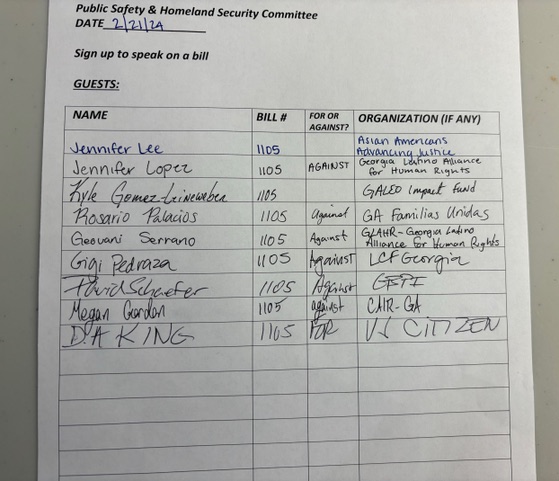
Committee Chairman:
… author of the bill before we… Mr. Norris you have anything you wanna say? If you’ll go to the podium, please. I’m referring to Terry Norris with the sheriff’s association.
Terry Norris, GA Sheroff’s Association lobbyist:
Thank you Mr. Chairman and members of the committee. Uh, deja vu all over again. So, uh, thank you [inaudible 00:00:20]. So a couple of things. Uh, we do not know how many sheriffs are not reporting to ICE on that security. Um, there’s been some inquiries by others who may have information. Uh, it is the policy, of course, of the Georgia Sheriffs Association to comply for… to train the sheriffs on compliance with law. And as such, we did, uh, and the representative placed some of our training, uh, variables into the bill.
So, to make it perfectly clear, perfectly clear, we don’t know how many sheriffs we present. There are some, because some have said they wouldn’t, number one. Number two, we have trained on this issue. We will continue to training… to train on the issue. But there’s a, there- there’s a piece to this that we don’t understand and that is how this check actually occurs. The representative described in general how it does occur. It is… And we’re trying to find this out now. We are trying to reach out to GCIC to see that when we do a name check on Terry Norris, how that check runs toward the law enforcement support group to identify whether I’m here legally.
We’re a little fuzzy on that, so we are, as I said, looking into that. So hopefully before a subsequent conversation, assuming there is one, we’ll be able to describe that process more. There’s a real important fundamental value to all this. If the Department of Homeland S- US Department of Homeland Security and ICE has never had contact with Terry Norris, they’re not going to know whether I’m illegal or not ’cause I’m in the country. So far fewer people that they’re running the criminal history record check on are getting any kind of response from ICE, DHS. That was told to me by one of the sheriffs this week.
So when there is a return of a, “Uh, yes, we know Terry is here illegally, and what’s he charged with?” That kind of conversation, then sometimes a detainer is placed on that person. If it’s not a serious felony offense, Terry Norris is gonna get out of jail just like any citizen of, of the s- United States is, if there’s a bond, $24, 48. So there- there’s a lot of fuzz out there for us in understanding this whole process.
In terms of the bill, we said it the other day, and we’ll repeat it. If a sheriff is not complying with whatever this process is and is intentionally not doing it, you know, certainly, they should be doing it and certainly, there should be a sanction. Our recommendation on the sanction was to create a, a situation where it’s a violation of oath of office. If there is a violation of oath of office, presently in our law, the governor can appoint two sheriffs and the attorney general to look at the situation, misfeasance, malfeasance, violation of, of the law.
So there’s something already in the law that exists and our recommendation would be rather than criminalizing it through a misdemeanor of higher nature, uh… aggravated nature to use that code section. And finally, as important to us at the sheriff’s association, I said to you all the other day, we- we’ve stood up a more robust jail reporting system. We wanna know who’s in jails. Not only, uh, illegals, but how many are on probation, parole, whatever it is. Because we wanna give the General Assembly a more accurate picture of what criminal justice reform and other state policies have done for the local jail population.
A lot of people in jail now are there. In the past, they may have been in prison. They’re on probation. Vast majority of people in jail now are on probation. And these are people that should be in the state prison system, but no, they’re not. They’re in the county jail. So what does that mean? You and I as local property taxpayers are paying for all sorts of drugs, psychotropics, and everything else. So our jail, not to didre- digress, but our jail population is an important thing for you all to know about.
This would be a very important addition to that jail population report. So those two things are what we have in mind. Again, we, we want to better understand this whole process of going through GCIC to Homeland Security and ICE. And if we’ve got sheriffs not doing it, we’ll be the first ones to try to help them understand the need to do it.
Committee Chairman:
Fair enough. Any questions for Terry? Representative Lott.
Representative Lott:
Uh, Mr. Norris, thanks for being here, thank you for all of that. So you kind of got me thinking about a few things, but is, is the other reporting, uh, required some of… Do we know, you were talking about transparency, do we know our jail population even beyond this concept?
Terry Norris:
By, by individual jail we do. And we started this new jail report. As I mentioned the other day, the State Department of Community Affairs did a very simple jail report up until last year or earlier in the previous year. So we took it upon ourselves to do the jail report. You know, we work for the sheriffs. We have the best line of communication with the sheriffs of anybody in this state. So we’ve often, in my 30-year career, we’ve often had to go to a sheriff and say, “Sheriff, you do realize you have to do this. Or, Sheriff, you’ve got open records requests on this. Have you thought about replying to it?”
So we think that… I don’t think we need legislation to do it, although it would help me get compliance with my jail report. We’ve got about half the sheriffs that are… that have jails, 142 jails in Georgia, about 38,000 people in county jails. So about half of those, a little less than half, are reporting to us. And it is our constant, uh, challenge to get these more, more and more sheriffs and jails on board. The hang-up a lot of times is their jail management system and integrating their software system with what we’re trying to… the data we’re trying to collect.
Representative Lott:
So, further in question, just in relating to what Representative Petrea is doing, is there any benefit or is it too complicated to add the additional reporting, um, requirements? Um, may- I, I know that I know what the representative probably said, that’s probably just complicating his bill, but you, um… but we have a lot of sort of lease ends in our jail, including how long our folks have been there.
Terry Norris:
Mm-hmm.
Representative Lott:
Some of that plays to the DAs that are sort of doing a similar thing as, as your sheriffs, which is not, you know, not moving certain cases, that kind of thing. So does your agency have reporting on that, or again, it’s just half of your sheriffs-
Terry Norris:
Well-
Representative Lott:
… uh, your jails that are reporting?
Terry Norris:
… two, two answers. Um, half are reporting to us now. We’re continuing our, our, our, for lack of a better term, marketing to sheriffs to explain how important this is for them to report to us so that we can tell you, so that we don’t see something in a bill that says, “Sheriff, you’ve got to report this to the Department of Audit-”
Representative Lott:
Right.
Terry Norris:
… which to us, no disrespect, is totally unacceptable. You all are gonna be setting policy. We would disagree with that police. So we want our jail report to be the most robust possible. And as far as what goes into the jail report concerning this matter, you know, we certainly would want to not necessarily go line to line, even though we are trained in this way. For instance, there’s a part here that says that, uh, you’ve got a report on those that are in your jail illegal.
Well, how is the sheriff gonna do that? How do you determ- make that determination? Who do you go to? That’s not something that the sheriff’s able to do. If it is confirmed that this person is illegal and we’re following the law to determine whether I says they’re illegal, then yes, we wanna report that. Do we wanna report the number of detainers? Of course. We can report all of that. A little… A few of these things in here that we actually train on is somewhat unreachable to, to most of these sheriffs.
Representative Lott:
Thank you.
Committee Chairman:
Representative Evans.
Representative Evans:
Thank you Mr. Chairman. Yes, I guess, uh, that’s just a note I had and it sounds like you just talked about it. ‘Cause you were making your, your points and you said number three was how does the check work for law enforcement? How do, how do you go through G- GCIC? And so you’re saying, you… a lot of it’s unclear about how you’d be able to com- how your, your deci- how the sheriffs would be able to comply with this law?
Terry Norris:
Well, what I’m saying is, it all starts with an arrest.
Representative Evans:
Right.
Terry Norris:
And the arrest is not always done by the sheriff. The sh- arrest is sometimes done by the Atlanta Police Department, and goes to the Fulton County Jail, for instance.
Representative Evans:
Mm-hmm.
Terry Norris:
So when that person is arrested, that person is booked in jail, fingerprint, photograph, basic information. Unless that person admits when they come in the door that, “I was not born in this country,” we’re not gonna know. Especially if the, the next piece of that is that information is, is pushed along this arrest to the Georgia Crime Information Center. But what it ha- it does after that, and the representative mentioned this, the law enforcement support group, that’s the part that we’re a little bit unclear about.
Does, does that information come back to GCIC and they know that Terry Norris is… was not born in the country and ICE has been told about it, or is it something that the sheriff actually pushes themselves? And I don’t know the answer to that. I thought I did the other day. I, I testified more clearly about this until I started talking to more sheriffs. But I, I really believe, y’all, that we, we will do this. We need to find, uh, uh… We need to have a better conversation with GCIC to get this explained to us. And, uh, Representative [inaudible 00:10:45] and I talked about this the other day, and he… I think he agrees with that. Do, do you not agree with the GCIC thought?
Speaker 5:
[inaudible 00:10:50].
Terry Norris:
Uh, have I misstated? ‘Cause I, I mean, you, you seem to be more clear about some of this than I am.
Speaker 5:
Well, uh, so, you know, I want you to be thoroughly heard, uh, Mr. Norris, but here- here’s what I mean. To the question, so what this does, um, so I can’t imagine trying not to identify someone being placed into a jail. And what this does, uh, uh, the, the process is clearly outlined. You positively identify the individual. Uh, and it goes on to talk about a Form I-944. It talks about a passport. It talks about resident alien card. So individuals that are in the country, um, uh, even if they’re non-citizens, are required to have identification.
And all of those things are kind of described here. So there’s a multitude of ways we can try to discover who someone is. It would seem to me that that’s important, especially today. If you look at the news, if you look at polls, the number one concern in people’s minds today, we’ve had 10 million people in the last three years enter the country illegally, okay?
So, um, as a, as a matter of public safety, we should know who’s winding up in our jails for a multitude of crimes. And I, I have a hard time getting my head around that. Um, so a- again, I’m… Mr. uh, Mr. Norris has been most helpful to me. And I want every issue he has to be heard. But I have to also be honest with you and tell you this. This is a bill that’s been on… in the books for 18 years. 18 years. And, and basically, we’re hearing that half the sheriffs are doing it. I, I, you know, I have a hard time understanding that, Mr. Chairman. But, but, I, I want every concern. My sheriffs support this. I represent two of them. They’re all in.
They tell me they do it right. And they tell me it’s not a burden to do it right. But I’ve got a quote from a Georgia sheriff, I’m sure there’s others, “What we will not be doing is notifying ICE of anybody’s immigration status in the jail or any of our facilities.” So we can debate minutia all day long, and I wanna get the minutia right because it, it matters. But what we need to do is deal with an issue that I believe is very important to the public safety of this state. And I, I don’t want anything to derail that.
Glad to work the process out as long as we can ensure people are doing it and then they report it such that we know they’re doing it, I’m happy, Mr. Chairman.
Committee Chairman:
And we agree that everybody ought to be doing it.
Speaker 5:
Yes, sir.
Committee Chairman:
Absolutely.
Speaker 5:
Yes, sir.
Committee Chairman:
Representative [inaudible 00:13:37].
Representative Evans:
I have one more question, uh, for Chairman P- Petrea [inaudible 00:13:41]. Uh, do you think asylum seekers are illegal criminal aliens?
Speaker 5:
No, ma’am, I do not.
Representative Evans:
Okay.
Speaker 5:
They… But they have… they also have identification.
Representative Evans:
Uh-huh.
Speaker 5:
So we’re not talking about asylums. We’re not talking about anyone here on a visa-
Representative Evans:
Okay.
Speaker 5:
… or any kind of legal, a multitude of reasons.
Representative Evans:
Mm-hmm.
Speaker 5:
We’re talking about all we’re talking about. It, it… In other words, we’re talking about anybody, including US citizens. So if I’m in, in a jail-
Representative Evans:
Mm-hmm.
Speaker 5:
… they’re gonna possibly identify me, right?
Representative Evans:
Mm-hmm.
Speaker 5:
Shouldn’t we be doing that with everything? Are the, are the, are the citizens only subjected to something that non-citizens aren’t?
Representative Evans:
No.
Speaker 5:
Of course not.
Representative Evans:
No.
Speaker 5:
So what we’re talking about is positively identifying everyone who goes in a jail.
Representative Evans:
Yeah.
Speaker 5:
So it doesn’t matter who they are. (laughs) I mean, this is so [inaudible 00:14:27], I can’t, I can’t fathom, uh… I wanna otherwise, I wanna throw this out here if I could, uh, to my friend, um, Chairman Petrea. That rests back to a point that Mr. Norris was trying to make. I think we’re living in a fool’s paradise to believe that everybody that comes across the border is gonna have some type of form of identification.
All right. And so, so, right. What are we gonna do about those people that just… We don’t have anything, and we don’t know who they are, we don’t know where they came from. They don’t have fingerprint. They don’t have a history, they’ve just showed up on the doorstep of America. And they have been accused of committing a crime. So, so how are we gonna ask our share of the report those, those people? Mr. Chairman the bill only requires… the current statute only requires they report that to ICE.
Committee Chairman:
They don’t [inaudible 00:15:23]-
Speaker 5:
They can fingerprint them like they do everybody else and send it to ICE and go home. The measure… You’ve got to remember, ’cause it gets obfuscated sometimes, they don’t have to do anything but send it electronically to, to, to the Feds.
Committee Chairman:
There’s no [inaudible 00:15:39].
Speaker 5:
There- there’s pushing a button and saying, “Here’s the guy. Can’t find any identification. I’ve tried all these avenues.” And by the way, if you’re interested, look on 51 on down, the multitude of ways, whether they have a passport. If they don’t have any of that. “Here’s who I got. He’s in for a crime of rape or whatever.” And you’ve reported it to ICE. To, Terry’s point, they may not know anything about this individual, but they may.
Committee Chairman:
Right.
Speaker 5:
Okay. But they may. And if they don’t, your, your obligation, your duty is to do nothing but report.
Committee Chairman:
Very clear.
Speaker 5:
We’re not asking them to do anything after reporting.
Committee Chairman:
Very clear.
Speaker 5:
It’s very simple.
Committee Chairman:
Representative Cummings.
Representative Cummings:
Thank you. I don’t know if you were aware there was an article in the AJC that came out in 2019 about this. And there seems to be a cost. I know Gwinnett from 2009, the, the time of the reporting in 2019, they had paid 15 million to comply with the program. And Bartow County tried to comply with the program for 13 months, and then they sent in something to ICE saying they couldn’t participate ’cause they had a staff shortage.
So I’m just wondering if you had… you knew about any of that ’cause not every sheriff’s department is not complying just to be not complying? And if somebody has a staff shortage, and we know a lot of law enforcement agencies do have staff shortages now, and that the sheriff determines, “I don’t have a lot of immigrants, it’s not worth it, and we don’t have the time, you know, to staff with the money,” how is that going to be dealt with?
Speaker 5:
You know, yes, ma’am, I can speak to that. I think what you… I don’t know about the specific situation, but I know what you’re talking about. You’re talking at a pro- about a program called 287(g). 287(g) is completely unrelated to this discussion. So yes, formerly the Sheriff of Gwinnett County and Cobb County worked with 287(g). New leadership came in and did away with that. I would suggest it was a lot… look at the comment I just read to you, it’s a lot more to that, uh, the reasons for discontinuing that program than funding.
However, to your good point and fair point about the cost to a system, they don’t have to work with 287(g). That is a completely separate issue. Remember, the current statute doesn’t say you have to work with the 287(g) through the federal program. It says you have to report to ICE when, when non-citizens are in your jails. Nothing more. It is literally pushing a button, sending information to the Law Enfor- Law Enforcement Support Center of the United States, Department of Homeland Security, and you’re done.
So that… So there is no fiscal issue here, but it’s a very good point because I think it’s helpful to let everybody know we’re not talking about 287(g), which some systems work with, some don’t. That is a completely different issue. Re- Representative Sainz, you have a question [inaudible 00:18:35].
Committee Chairman:
Thank you. And, I, uh, uh, I initially marked to, uh, to clarify that statement ’cause, I, I, say, the author is much more knowledgeable than, than I am, but has already cleared that. But I wanted to, uh, highlight ’cause I think it’s important, uh, e- e- even if there’s a small cost, but not to that level, uh, what we’re saying here is that it is a public safety data point to ensure that we have a consistent information on monitoring, um, those in our jail that may or may not stay there, may or may not be adjudicated in different capacities, who in our jail we have accurate understanding is, is here legally or not, because that has different public safety implications on finding them, um, having them in our GCI system, being able to find them for warrants, et cetera. Is that the, the summary of the public safety need?
Speaker 5:
I, I think so, Mr. Chairman, and to your point, we all know, unfortunately, that, uh, the, the level of recidivism, uh, in our criminal populations, all criminal populations, which are mostly our own citizens, we know the re- level of recidivism. We don’t know who this person is. How do we know they didn’t… Perhaps they were just, uh, com- they, they were just in a jail in adjacent state for some other crime. This is about public safety. And yes, I think, um, I, I, think, I, I, think people recognize that.
Committee Chairman:
Just one-
Speaker 5:
[inaudible 00:19:54]. Do you have my papers? Yeah.
Committee Chairman:
One small follow-up, because I think it’s, it’s, uh, important to make clear, um, there’s some questions about asylum seekers being confused to this, which is clearly not a, um, uh… associated. But thi- this is a pro-legal immigration bill. Is it not true that those that are vu- left vulnerable, uh, uh, by those who, uh, would come out of jail, be unmonitored, are, uh, oftentimes those in, in our, uh, minority communities? So this is a pro-safety bill, a pro-legal immigrant bill, and it’s purely just ensuring that our state has an accurate depiction of this population.
Speaker 5:
I would say it’s not, I was say, sir, chairman, this is, uh, a pro, uh, everybody in Georgia bill. If you’re interested in public safety. And yes, to your point, if you have people, uh, not in the country, their, their, their, their victims tend to oftentimes be in that same community. Um, this is about sim- simple public safety. And to your question, you know, I, I finally have your report. Does everybody have a copy of this?
Committee Chairman:
Yes.
Speaker 5:
Right. So, listen, uh, the… is it important? I don’t know. There’s at least 241, uh, children who have been molested in this state, according to the ICE detainers, by people illegally in this country. Do their families care? I, I suspect they do. What about the 182 murderers? That’s at least 182 people Georgians murdered.
Committee Chairman:
Those are people that have been convicted of murder inside our prison system.
Speaker 5:
That’s convic- This is just in… And this is just in a jail.
Committee Chairman:
Yeah.
Speaker 5:
Let’s just make sure we know who is in this country if they’re committing crimes. This is very simple, Mr. Chairman.
Committee Chairman:
Now we’re gonna hear from Mr. Norris. You have one more comment. We’ve got few people-
Terry Norris:
One more comment, uh, for clarity’s purposes. We fingerprint and ID everybody that comes to a jail-
Committee Chairman:
Mm-hmm.
Terry Norris:
… for a lot of reasons, mainly liability. Who’s in there? So I, I didn’t want the communi- the committees to think that we did not. We, we fingerprinted and it goes to the Georgia Crime Information Center, to the National Crime Information Center, to the US Department of Homeland Security, ICE, those places. But if we don’t get anything back, a warrant or… a warrant on someone, they can get out of jail like anybody else. And they should get out, because nobody wants them, uh, other than this particular offense, which I call, just for that, that purpose. [inaudible 00:22:10].
Committee Chairman:
We’ve got several people that want to speak and what I would say to you is we’re, we’re, we’re losing our, our room here and we’ve, uh, we’ve heard a lot of, uh, comments about this and I’m gonna give… part of the legislative process is to give you a voice over here. We want you to be able to, to speak. Uh, we’re gonna give you three minutes. If you wanna all line up on… behind the podium there. We’re gonna start off with Jennifer Lee. Jennifer Lee. Next behind her will be Jennifer Lopez. If you’ll be clear and concise and to the point, please.
Jennifer Lee:
All right, thank you Mr. Chairman. My name is Jennifer Lee and I’m the policy director at Asian Americans Advancing Justice-Atlanta. We’re a non-profit legal organization, uh, dedicated to protecting the rights of Asian American and other immigrant communities in Georgia. Um, one of the things my organization does is provide immigration legal services to a wide variety of clients.
So our attorneys do things like assist individuals through the US citizen application process, um, and sometimes help them obtain lawful status. Um, we’re also involved with policy advocacy at the federal level to address certain flaws in immigration law that have harmed some of our clients. And so I just wanna lift up a couple of examples because I think it’s important for everyone to understand that immigration law, um, is, is not black and white. It’s, it’s, it’s very complicated, um, and there are a couple examples, um, that we’ve seen with our clients I’d like to lift up.
And first is the case of international adoptees. So hundreds of thousands of children have been internationally adopted by US citizens since the 1940s, and prior to the passage of the Child Citizenship Act in the year 2000 as a federal law, adopted children were not automatically granted US citizenship. Um, many adoptees and their families incorrectly believe that their children did become citizens upon adoptions. And there was a, uh, attempt to update that flaw, um, i- with the Child Citizenship Act, which did update that policy. So fortunately, that is federal law now.
But it left out a lot of adoptees that were born before 1983 who do not receive those same protections. So many of those older adoptees that we see now in our communities are in legal limbo and have been vulnerable to deportation. Um, another related flaw, uh, related to that same Child Citizenship Act, there are many individuals who were children when they moved to the US to live with their fathers, and their fathers naturalized to US citizenship. Today, these children would become US citizens because they have US citizen fathers.
Committee Chairman:
60 seconds.
Jennifer Lee:
Thank you. But in the past, this did not apply to many parents who did not have legal marriages that were recognized in the US. And again, that policy change was not made re- retroactive. We have represented…
Speaker 1:
… who’ve lived in the US. For nearly all their lives, they believed themselves to be US citizens and then were deported because of these flaws in immigration policies. So these are just a couple of examples. Um, we believe that mandating local officials to do this type of blink in immigration enforcement, um, just incorrectly targets, um, limited policing resources. And we’re afraid that all may mistakenly affect, um, harm families and communities, um, in our state. And so, um, thank you for your consideration and understanding that some of these, um, cases are just very complicated and, um, people can get caught up in sort of these aggressive policies. Thank you.
Committee Chairman:
Okay. If you don’t break the law, you will get caught up in this-this legislation. Next we have Jennifer Lopez.
Jennifer Lopez:
Good afternoon, Mr. Chairman and members of the committee. My name is Jennifer Lopez and I’m with the Georgia Latino Alliance for Human Rights, also known as GLAHR. GLAHR is a nonprofit community grassroots organization that educates, uh, organizes, and empowers the Latinx community across Georgie to defend, uh, to defend and advance their civil, uh, and human right.
So we are here today to oppose HB 1105. And the majority of this language, uh, in the legislation echoes Secure Communities which is a former DHS program, um, that was discontinued in 2017. The program identified undocumented individuals who had been arrested but even for violations as minor as a traffic stop. So just like HB 1105, the Secure Communities program was flawed and did not target convicted criminals who are deemed violent and dangerous. And in 2011, 26% of those deported through Secure Communities were only guilty of being undocumented and had no previous criminal charges.
Because the targeted people at the time of arrest have no conviction, Secure Communities detained individuals who never charged, but the state crime as well as those who were wrongfully arrested. Additionally, HB 1105 will cause the unlawful detention of US citizen. The use of the phrase suspected national … uh, for a national racism concerns of increased racial profiling in arrest proceedings.
For example in 2008, Jilmar Ramos G-Gomez who served in as a US Marine, um, was issued an ICE detainer even after, you know, his proof of citizenship was available. He was in custody for almost a month. So this bill would put officers and sheriffs in a difficult situation opening-opening up cases of civil and human rights violations.
GLAHR has sent numerous letters throughout the years to share its offices in order to help them understand the detainer policies and avoid costly liabilities. We urge to take everything I’ve stated in consideration and vote No to HB 1105. Thank you.
Committee Chairman:
Thank you. Thank you very much for the vote. We got Kyle Gomez Leineweber.
Kyle Gomez Leineweber:
Leineweber.
Committee Chairman:
Leineweber.
Kyle Gomez Leineweber:
Yes, sir.
Committee Chairman:
Okay.
Kyle Gomez Leineweber:
Thank you.
Committee Chairman:
Go ahead.
Kyle Gomez Leineweber:
Thank you, Mr. Chairman, and uh, members of the Public Safety and Homeland Security Committee. Uh, my name is Kyle Gomez Lieneweber. Uh, I’m the Director of Public Policy for, uh, the-the GALEO Impact Fund. Uh, our organization advocates for and uplifts the voices of Latino throughout our great state. To that end, I stand before you today to express our serious concerns with this bill. Uh, particularly we have concerns, uh, around the, uh, language … excuse me, language around mandating jailers to identify inmates as suspected foreign nationals. Uh, it’s not only vague on the actual process, but it establish, uh, that it establishes, but it would likely lead, uh, to racial profiling.
The bill will not just lead to dis-disproportionate disruption of lives for low-level offenses, or even charges that are ultimately cleared, but given the aforementioned language and the re- and the reality of an immigration that I think everyone here agrees is broken, uh, uh, it is likely that our answers, particularly our Latino citizens and legal residents will be unnecessarily put at risk. Uh, we’ve seen this play out with programs like 287G, uh, and instances where citizens and legal residents, uh, who happened to be Latino were deported.
Uh, if passed, this legislation will drive a wedge between local public safety official and the communities they serve. This will be especially true in the business and communities where trust of law enforcement is already tenuous. This creates an additional burden and responsibility for local jurisdictions at a time when jails are understaffed, uh, struggle with overcrowding, and basic upkeep. Programs like this have been tried before with no tangible success in making our communities safe. According to DGPI, between 2008 and 2018, local governments spent $88 to participate in 287G. Today just 6 of Georgia’s 159 counties participate in 287G. And we understand this is not 287G, but there are similarities in process and, we believe, in impact.
Uh, this ta-
Committee Chairman:
30 seconds.
Kyle Gomez Leineweber:
Thank you.
These types of unfunded mandates are not the kind of support our communities need. Overall HB 1105, if it becomes law will almost immediately get tied up in courts with the Georgia taxpayers’ expense. Uh, and even if this bill were to be enforced, the result would be a costly, discriminatory, and disruptive program that will hurt Georgia communities, businesses, and families.
Committee Chairman:
Thank you for your time. Mr. Surinam? Surinam? Miss Rhea?
Rosario Palacios:
Is it Rosario?
Committee Chairman:
One more time?
Rosario Palacios:
Rosario Palacios?
Committee Chairman:
Uh, let’s see. Sure.
Rosario Palacios:
Okay. (laughs)
Committee Chairman:
Go ahead. (laughs)
Rosario Palacios:
Thank you.
Committee Chairman:
You got three minutes.
Rosario Palacios:
Yes, sir. Thank you, Ch- uh, Mr. Chair, and thank you to the committee. My name is Rosario Palacios and I’m a mother of four, uh, a caregiver to my spouse and my brother. I’m also the Executive Director to Georgia Familias Unidas. I dedicate a lot of my time volunteering to my community promoting higher education and tech skills and the professional of-of the community that I serve. I’m also a former poultry plant worker which is why Georgia Familias Unidas was started, to aid a lot of folks in Gainesville who have worked in poultry or their parents worked in poultry.
And so, I come today as someone who shares many lived experiences with the community that I hope to advocate for when it comes to some of the non-intended implications of laws like this. Um, I have reviewed the language in this legislation. I’ve not only, uh, lived these experiences, I’ve served as a policy anas- analyst for nonprofit organizations for eight years.
Section 3 of this legislation requires more process and changes what federal law were using as the standard for what is deemed as someone who should be targeted or should be, uh, detained and held for-for further questioning and further profiling.
So this law has gaps that I worry about for at drivers of domestic violence. And I bring this up as a survivor myself. Growing up in Gainesville undocumented, I saw my US citizen father leverage his privilege and status of his own children and my mother who survived many, many years in physical abuse.
I also can say this as a survivor of domestic violence myself. That when I was a legal permanent resident before I became naturalized, I thought twice about calling law enforcement because if there is any kind of scratch on the abuser from, uh, from me defending myself, then I knew what would happen. I knew that, uh, law enforcement could take both of us into custody, and then that my immigration status would be in question.
Committee Chairman:
60 seconds.
Rosario Palacios:
Thank you. I have lived these things firsthand. I know what, uh, systems like 287G looks like, and I’ve reviewed the language in Section 3. I know that Section 3, uh, DB, doesn’t even allow for any kind of paperwork that I have as naturalized citizens. And I think of people like my sister, Maria Estelle, who came into the border, was allowed into by immigration officials as an asylum seeker and I think what- like I have lived like my mother has lived before. So I ask that this committee look through Section 3 much, much more. Honestly, I oppose the entire bill, but Section 3 doesn’t just have implications for sheriffs, it also has implications for people who are detained and not convicted of any crimes. And as a domestics violence survivor and as one who serves the community of many mothers struggling with this issue, I ask that you please consider their cases and vote No on this legislation.
Committee Chairman:
Thank you very much.
Rosario Palacios:
Thank you.
Committee Chairman:
We appreciate your being here with us today. Geovani Serrano. And then after Giovani, we’ll have Gigi, uh, Pedraza. Go ahead. You have three minutes please.
Geovani Serrano:
Hi, good afternoon, uh, Mr. Chairman and members of the committee. Uh, my name is Geovani Serrano. I am a community organizer with the Georgia Latino Alliance for Human Rights, GLAHR. And today, we are here to oppose HB 1105. Uh, there is already a prog- a federal program that the Department of Homeland Security purports to focus its real status check programs. Uh, that is known as the Criminal Apprehension Program, CAP, on immi- on immigrants with zero criminal background. On the this program, individuals in jails or prison may be iden-identified by CAP when they have only pending charges, and will be included as CAP removals even if they have never been committed of a crime.
Um, according to Department of Homeland Security statistics, 11% of immigrants apprehended on their CAP are not criminals at all. For instance, in October 2009, the initial report found that 50% of immigrants identified through the CAP in year 2009 have no criminal convictions at all. Uh, in a- also in a study conducted by the GBPI, uh, they found out that during 2003 to 2020, most of the undocumented people who were apprehended in Georgia committed low-level, uh, or non-violent infractions. The approach to enforcement on HB 1105 focuses broadly on the apprehension on undocumented immigrants not just those with criminal record. And prioritizing immigration enforcement over a broader pub-public safety concerns result to insignificant compounding currently to immigrant community with signs to increasing this predatory practices within 2019 to 2020, where-where political parties do not have any leverage for their political platforms and nothing else to in lieu their support and increasing anti-immigrant sentiment to win political campaigns.
Moreover, um, HB, uh, 1105, uh, pose an extra burden, uh, on those who are already struggling with retention of officers and admin- um, by punishing, uh, by the punishment in this bill, it makes this job even less appealing to potentially have more people applying- have more running the anti-jails, which we know is a major issue all acla- across the star- state of Georgia.
In addition, in this year, uh, where a legislative body is focusing on protecting our youth, uh, we cannot take for granted that in our state, in-in the state of Georgia, Latinx teens with a family member who is detained or been deported, have experienced an increased suicidal iden- identification, alcohol consumption, and aggressive behavior. This is why one of the reasons why we urge you to vote No in HB 1105, because it has a major currents on our youth who are-are experiencing many, uh, many cases and with lack of, uh, mental health, uh, uh, services in the state of Georgia is causing many of them to potentially be detained and sent to-to county jails too as well. So, thank you.
Committee Chairman:
Thank you for being here today. Gigi?
Gigi Pedraza:
Good afternoon. My name is Gigi Pedraza. I’m the Executive Director of the Latino Community Fund in Georgia.
Committee Chairman:
[inaudible 00:12:14]
Gigi Pedraza:
We are a nonprofit organization. Yes.
Committee Chairman:
Okay, go ahead.
Gigi Pedraza:
Nonprofit organization working to advance people’s democracy, protecting and building community, and expanding economic opportunity. Today I am here to bring some examples of the imperfect records that exist at the immigrations and customs informant- enforcement office just as Director Norris mentioned. Between 2002 and 2017, there were over 2,800 American citizens I had wrongly identified as eligible for deportation. Today I will share three of them that actually pursued legal ac-action, one of them in Georgia.
Mark Lidel, in 2018. Lidel, um, was a citizen that was deported to Mexico because of the records that I provided. He was held for six weeks with no legal assistance and deported. From Mexico, he was deported to Honduras because he was not a Mexican national. In Honduras, he was imprisoned and jailed for weeks. From there, he was deported to Guatemala where he was eventually able to reach the US embassy. The US embassy talked to his brother who served in the military, was able to get a passport, a US passport. He was able to fly back to Georgia where for hours he was detained. There was- There is a legal case in Georgia because of this case. That was 2018.
There was a similar case, Eduardo Caravaggio in 2011, Sergio Carillo in 2017. So again, these are just three cases that I bring to your attention. We believe that the language, uh, is imprecise in this bill. We believe the process is extremely difficult to be implemented. Um, and then the places and then the wording on local jurisdictions like our colleagues said here. Additionally, this created additional expenses to taxpayers in Georgia. Thank you for your time. We are opposed to the bill.
Committee Chairman:
Thank you. We have, uh, next, David Schaefer. Is it David Shaffer?
David Schaefer:
Thank you, Mr. Chair. My name’s David Schaefer. I’m the Vice-President of Research and Policy of the Georgia Budget and Policy Institute. Our aim is to advance lasting solutions that expand economic opportunities for all Georgians. We rise in opposition to this bill. In addition to agreeing with the sentiments, uh, provided, uh, by others in this room, I do want to highlight that, uh, we are unclear how much this thing would cost, and we think that there could be fairly fiscal implications. A colleague from GALEO has already mentioned on figure, uh, around $88 million just to give one as to, you know, the cost of detainer enforcement from 2008 to 2017 to Georgia’s city and county governments, but also to say that many times the feds are not covering this cost. And federal grants are really only covering about 3% to 10% of the cost reimbursements, uh, in, uh, the enforcement of detainers. So, without a fiscal lid on this bill, uh, without really a sense of what the cost is, it’s-it’s very difficult to make a, I think, a wise decision on its implementation.
In addition, I’d like to say, after working on this area for 20 years including as an immigration attorney, there are a lot of unintended consequences. People do get caught up in systems. If there is not clarity around what things cost, if it’s not clear what procedures should be implemented, when, there’s always somebody that was unintentionally caught up in that. It complicates their lives. Uh, it often happens at a greater scale than we ever imagined. And I’ve seen that both as-as a paralegal working on the Georgia Department of Corrections and working on the immigration side, uh, bo-both in sort of superior court but also in-in local immigration courts here in Atlanta.
So I wanted to raise these issues and we rise in opposition to the bill, but we do agree with the sen-sentiments previously stated. Thank you so much for your time.
Committee Chairman:
Thank you. Uh, Megan Gordon will be next.
Megan Gordon:
Hi, Mr. Chairman, members of the committee, I’m going to go real fast because I’m doing the same committee shuffle you all are doing today.
Committee Chairman:
Bless your heart.
Megan Gordon:
(laughs)
Committee Chairman:
Go ahead, go ahead, thank you.
Megan Gordon:
Um, I know you all can relate. My name is Megan Gordon. I’m the Policy Manager at the Georgia Chapter of the Council on American-Islamic Relations, and I just want to point out a technical problem with this bill. Um, you all have heard asylum mentioned a couple of times today, and I want to point out why that is. If you all would join on me line 47, if you were so inclined, um, that’s where the legislation sets out the-this s-standard for which, um, what law enforcement will be looking when-when they are deciding whether they need to-to notify ICE about someone. And that says they are looking lawful admission and current lawful status of the foreign national. That is where we have a problem, a legal problem, because there are multiple types of immigration status where someone could enter the country illegally but then gain corona- uh, but then gain lawful status. DACA is-is a pretty commonly known one when people come in as a- as undocumented children and then gain status.
Asylum is one because in asylum cases, someone crosses the border illegally and then presents themselves to law enforcement and says, “Hi, please help me. Um, I can’t- It’s not safe for me in my country. Please put me through the legal proceedings degree status.” And so, um, by putting that, and we’re essentially raising the bar higher than federal immigration law, a-and we’ll be notifying ICE of people who are actually legally entitled to be here.
And now, I won’t pretend to have insight into the backend of law enforcement. I don’t know what ICE is going to do about that. We are compelling law enforcement to call them. I don’t know if ICE is going to say, “Hey, friend, um, thanks but no thanks. Have a good day.” Or they’re going to actually show a-and put into deportation proceedings people who don’t need to be in deportation proceedings. Because as Gigi said, mistakes happen. Um, there are people who have been deported who-who shouldn’t have been because, um, i-if we all agree on one thing, it’s that our immigration law is a hot mess (laughs) and it’s very difficult to understand.
Committee Chairman:
Uh, okay. Thank you for being with us today.
Megan Gordon:
So that’s all I have for you all. Thank you.
Committee Chairman:
Okay. Mr. DA King, I want to give you three minutes. If you feel free to just take one, if you’d like to.
DA King:
Thank you, Mr. Chairman. Um, my name is DA King. I am President of the Dustin Inman Society. The Dustin Inman Society is named after a young man from Woodstock, Georgia, who will always be 16 years old because there’s a lot of people who don’t want us to enforce our immigration laws. Pretty maximalist liberal immigration laws on this planet. Um, it’s difficult to sit back there. I was here on this campus and helped create both of these laws and included- and-and helped modify them in various years. What you are hearing from people who do not want to punish or even report illegal aliens in this country is pretty standard boiler plate stuff from every hearing that’s ever happened, in any place near this capital on illegal immigration or the state taking an effort to do what the federal government refuses to do.
I’m not completely clear that everybody understands that what this bill is it inserts penalties into existing law. Um, as Representative Petrea mentioned, the 42414 is from 2006. That’s 18 years ago. The other one is 368023, it’s from 2010. I put that at 14 years ago. Um, we’re not trying to re-litigate that law, I hope. I hope we are considering whether or not we are actually going to make the rules in this state to compel the Sheriff’s Association to compel the sheriffs that they represent to actually enforce the, uh, comply with the laws based on the books as they are sworn to do.
Um, I’m-I’m trying to not to talk too fast but I-I’ve seen numbers that for the near internal poll, when I spoke with the ty- uh, Sheriff’s Association over the course of at least five years, um, I’ve seen number that-that showed 86 sheriff’s offices are in compliance with this. Maybe that number has gone up since last year when I saw it, but as I mentioned before, after 18 years, that doesn’t seem like a real good effort at-at compliance and I hope none of us ever tried to go that long without obeying a law.
Um, there’s a mention of we can- we can punish the sheriffs who are not in compliance-
Committee Chairman:
60 seconds.
DA King:
… by charging up with a violation of oath of office and then forming a panel by- with- for the governor. O-Or-Or by the governor, and then check it out from there. Again, I respectfully observe that the laws have been in the books for 18 years, pretty much everybody in the Sheriff’s Association knows that it’s not enforced, but there has been no panel. I have no reason to believe there would be, if you don’t put penalties in this law, in these two laws, if we don’t pass this bill out, I’m pretty sure I know what will happen. I’ve been doing this for 20 years. Um, I don’t know if my three minutes are up. I’ve got a lot more to say, though. I’m-I’m glad to go away.
Committee Chairman:
[inaudible 00:21:34] We appreciate you.
DA King:
Thank you, Mr. Chairman. Are there any questions?
Speaker 11:
I-I think I’ve got one question that [inaudible 00:21:41] reason of science. It’s not targeted to you. I-I just wanted to make sure to clarify just based on the testimony we received. I’m not sure. The constituency that all the groups represent but, um, I want to make sure everyone’s clear that, uh, the hours according to the Bureau of La-Labor Statistics, Hispanic citizens and legal residents are three times more likely to be victims of rape, robbery, or assault. And the way I see that this bill directly impacts and reduces that-that statistics, so I don’t know the constituents that some may claim to represent, but that’s the one I’m concerned with. Thank you.
Committee Chairman:
Thank you. I’m going to give the last word to the Chairman. [inaudible 00:22:19]
Speaker 13:
Thank you, Mr. Chairman. Uh, I’m going to- I’m going to sell you you something I’ve got to say. So, to-to the groups that spoke, you know, so I would, I almost want to ask those that spoke today if they’ve read the bill. Because quite frankly, I-I-I even the Georgia Budget and Policy Institute, I don’t know that the gentleman’s read the bill. Uh, it makes it clear in here. This has nothing to do with detaining anyone. Line 116, inmates- inmates should be held no longer than 48 hours. Line 108, an inmate identified as an illegal alien shall not be detained on the basis of being an illi- ill-illegal alien. My friends, this is all an intention to obfuscate the facts, and here are the facts.
This bill requires one simple act: reporting. Not detaining. You had multiple conversations about detaining. Nothing in this bill requires that. Nothing in this bill has to do with anyway … somebody spoke to apprehension of illegal aliens. This is not. These individuals are already in jail. This is not about apprehension. This is not about detaining. This is about simply reporting, Mr. Chairman.
And there’s one other thing I want to say. The issues that the individuals that are speaking again- against this measure have, is with the current statute. The current statute if you look at Section 3, that whole beginning there is current law. The- Doing this is already law. All I’ve done is put a penalty for those who don’t. So their problem is really with the ball- bill-bill that is already- the law that is already on the books. It isn’t with what I’m trying to do. What I’m trying to do is take the process that is currently utilized, put it in the law, and require that it be done. Mr. Chairman, that’s what we’re trying to do here in this law, as I said last time. Either put a penalty in there to require it be done and reporting that requires it be done, or move to eliminate it altogether. Somebody offer a bill to eliminate the measure altogether. There’s a lot of folks in this room that said you’d rather not do that. But what would the people of Georgia want? That’s what we got to deal with here as policy makers.
Committee Chairman:
To the members-
Speaker 13:
Mr. Chairman, that’s all I have to say.
Committee Chairman:
To the members of the Committee, thank you for hanging in there with us. I hope to see some advancement in this bill next week. I would a-ask my author- the author of the bill with my friend if he would continue to work with, uh, the Sheriff’s Association and do take this imperative that we have some buy-in from them and have some kind of comfort level, uh, as we move this bill forward. I think this is a good piece of legislation that will benefit, uh, public safety and the citizens of Georgia. There being no further, uh, committee business, we now stand adjourned.
Speaker 13:
Thank you, Chairman.
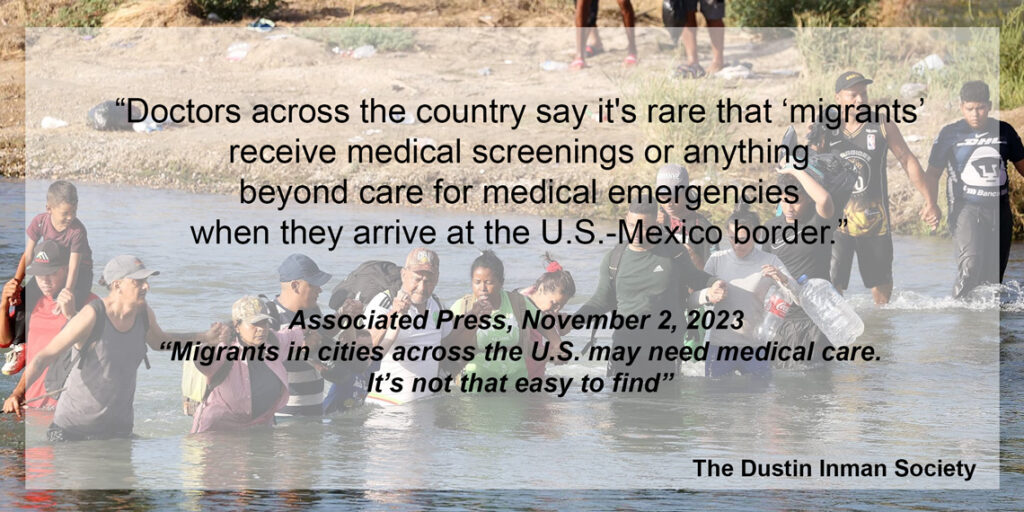

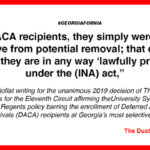





















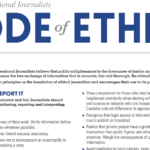
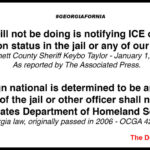




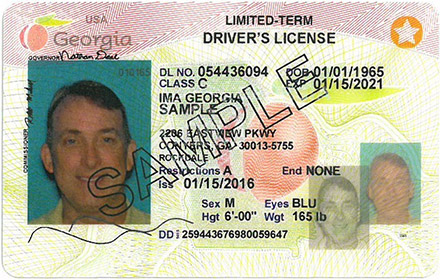




You must be logged in to post a comment.